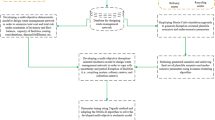Abstract
Waste management and circular economy objectives are worthwhile and worldwide challenges concerning both the protection of the environment and the conservation of natural resources with aim of zero waste. A considerable attention has been directed over the last decade towards the optimization of planning procedures related to waste management in order to empower circular economy ambition. This work investigates the operations of waste recycling centers where materials are collected by a fleet of trucks and then sorted in order to be converted in secondary raw materials. The activity is characterized by low margins, difficulties to track flows and uncertainties in supplies. In a previous work by Pinto and Stecca a formulation has been proposed to address and optimize the sorting process. However, special attention should be paid to the fact that waste streams processes are affected by several uncertainties, such as the stochastic processes regarding waste arrivals to sorting facilities. This work extends the above mentioned formulation by introducing robustness to data uncertainties related to waste supplies. Accordingly, the main aim of this study is to develop a mixed integer linear programming model for planning and scheduling the packaging waste recycling operations taking into consideration also the stochastic nature of waste arrivals. This is done by introducing a protection function in each constraint according to the probabilistic robust approach presented in (Bertsimas and Sim, Oper Res 52(1):35–53, 2004). This approach ensures deterministic and probabilistic guarantees on constraints satisfaction. The model supports other strategic decisions such as sizing of the amount of processed waste and allocation of the optimal number of operators for each shift of the waste sorting processes. Experiments are performed on instances taken from a real case scenario in Italy and comparisons are made against different planning strategies.
Access this chapter
Tax calculation will be finalised at checkout
Purchases are for personal use only
Similar content being viewed by others
References
Aringhieri, R., et al.: A special vehicle routing problem arising in the optimization of waste disposal: a real case. Transp. Sci. 52(2), 277–299 (2018)
Bertsimas, D., Sim, M.: The price of robustness. Oper. Res. 52(1), 35–53 (2004)
Flavio Bonomo, F., et al. “A method for optimizing waste collection using mathematical programming: a Buenos Aires case study. Waste Manag. Res. 30(3), 311–324 (2012)
Ghiani, G., et al.: Operations research in solid waste management: a survey of strategic and tactical issues. Comput. Oper. Res. 44, 22–32 (2014)
Pinto, D.M., Stecca, G.: Optimal planning of waste sorting operations through mixed integer linear programming. In: C. Gentile, G. Stecca, P. Ventura (eds.) Graphs and Combinatorial Optimization: From Theory to Application. Springer AIRO Series, vol 5, pp. 307–320, 2020
Samanlioglu, F.: A multi-objective mathematical model for the industrial hazardous waste location-routing problem. Eur. J. Oper. Res. 226(2), 332–340 (2013)
Stecca, G.: Electrical and electronic equipment recycling analyisis and simulation for urban reverse logistics services. In: International Symposium on Flexible Automation Awaji-Island, Hyogo, Japan, 14–16 July, pp. 1–6. ISFA (2014)
Acknowledgements
This work has been partially supported by EU POR-FESR program of LAZIO Region on “Circular Economy and Energy” through the project REMIND—REverse Manufacturing Innovation Decision system [Grant No. B86H18000160002] and POR-FESR on “Research Groups 2020” through the project PIPER—Piattaforma intelligente per lottimizzazione di operazioni di riciclo [Grant No. A0375-2020-36611, CUP B85F21001480002].
Author information
Authors and Affiliations
Corresponding author
Editor information
Editors and Affiliations
Rights and permissions
Copyright information
© 2021 The Author(s), under exclusive license to Springer Nature Switzerland AG
About this chapter
Cite this chapter
Pinto, D.M., Gentile, C., Stecca, G. (2021). Robust Optimal Planning of Waste Sorting Operations. In: Cerulli, R., Dell'Amico, M., Guerriero, F., Pacciarelli, D., Sforza, A. (eds) Optimization and Decision Science. AIRO Springer Series, vol 7. Springer, Cham. https://doi.org/10.1007/978-3-030-86841-3_10
Download citation
DOI: https://doi.org/10.1007/978-3-030-86841-3_10
Published:
Publisher Name: Springer, Cham
Print ISBN: 978-3-030-86840-6
Online ISBN: 978-3-030-86841-3
eBook Packages: Mathematics and StatisticsMathematics and Statistics (R0)




